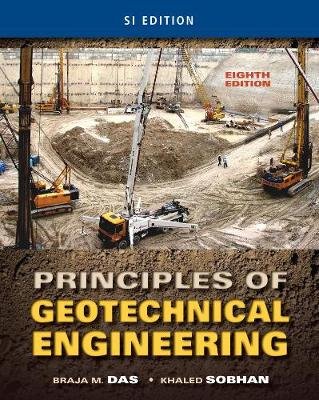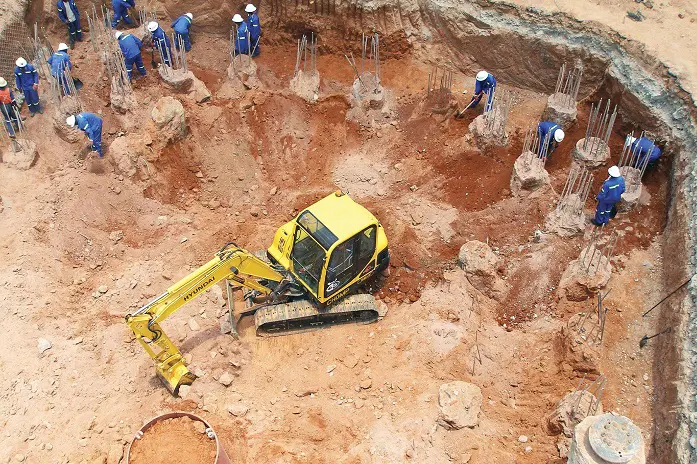Why All About Geotechnical Engineering Matters in Today's Infrastructure Advancement
Why All About Geotechnical Engineering Matters in Today's Infrastructure Advancement
Blog Article
The Relevance of Geotechnical Engineering in Attending To Environmental Challenges and Enhancing Building Security
Geotechnical engineering offers as a keystone in the junction of ecological stewardship and building safety and security, providing essential understandings right into the actions of dirt and rock under numerous conditions. By executing strategic website examinations and customized mitigation procedures, geotechnical designers play an essential duty in guarding both human lives and ecological stability.

Function of Geotechnical Design
Geotechnical engineering plays a critical function in the design and building and construction of framework by resolving the actions of dirt and rock products under different conditions. This field of engineering is crucial for comprehending the communication between structures and the ground, which includes determining the load-bearing capacity of dirt, examining security, and predicting prospective settlement or failing.
Geotechnical engineers are accountable for carrying out website investigations, which entail tasting and screening dirt and rock to collect information on their chemical and physical residential properties. This details is essential for developing structures, keeping walls, and various other earth-retaining structures that ensure safety and durability. Moreover, geotechnical engineering educates the selection of suitable building techniques and products, thereby reducing dangers linked with dirt behavior.
In addition, the assimilation of geotechnical engineering principles right into urban preparation and ecological monitoring is essential for addressing difficulties such as ground contamination and groundwater management. By understanding geotechnical factors, designers can develop lasting remedies that improve the strength of infrastructure against all-natural dangers, while additionally advertising ecological stewardship. Inevitably, the function of geotechnical design is important for achieving safe, sturdy, and eco mindful construction methods.
Soil Erosion Mitigation
Soil disintegration postures a considerable danger to both ecological stability and infrastructure stability, impacting roughly 24 billion lots of abundant dirt lost annually worldwide. This phenomenon is intensified by elements such as logging, urbanization, and poor farming techniques. Geotechnical engineering plays a pivotal function in establishing effective soil erosion mitigation strategies that safeguard both the atmosphere and construction tasks.
One technique requires the implementation of disintegration control techniques such as plant life growing, which maintains soil through origin systems. Furthermore, the building and construction of preserving walls and terraces can properly lower surface area overflow and protect vulnerable areas from erosion. Correct drainage design is also essential; it lessens water accumulation and guides excess overflow away from important structures.
Furthermore, geotechnical designers utilize dirt stabilization strategies, such as the application of geotextiles and eco-friendly mats, to improve dirt cohesion and stop deterioration - about geotechnical engineering. Routine monitoring and analysis of erosion-prone sites allow timely interventions, making sure lasting sustainability. By incorporating these strategies, geotechnical design not only alleviates the effects of soil erosion yet additionally contributes to the durability of framework against environmental difficulties, eventually fostering a much safer and more sustainable built environment
Groundwater Protection Strategies
Groundwater offers as a crucial source for alcohol consumption water, farming, and commercial processes, making its protection crucial for ecological sustainability and public health and wellness. Effective groundwater defense approaches are important in minimizing contamination dangers and guaranteeing the longevity of this resource.

Routine surveillance of groundwater top quality is likewise important, making it possible for very early discovery of contamination sources and facilitating prompt removal efforts. Using innovative modern technologies, such as geophysical surveys and remote noticing, aids in identifying possible threats to groundwater gets.
In addition, public education and learning and stakeholder engagement are important, promoting area support for groundwater protection initiatives. all about geotechnical engineering. By integrating regulatory steps, technological developments, and neighborhood involvement, we can create a comprehensive framework that safeguards groundwater resources while advertising sustainable growth and building methods
Landslide Threat Administration
Landslides position substantial threats to both human security and infrastructure, making reliable risk administration techniques essential. Geotechnical engineering plays a vital role in determining, assessing, and mitigating landslide risks. A detailed understanding of slope stability, dirt auto mechanics, and hydrology is vital for establishing efficient danger management strategies.
The initial step in landslide threat monitoring includes comprehensive site investigations, that include geological mapping and soil testing. These examinations aid designers examine the possibility for landslides by determining vital factors such as slope angles, dirt make-up, and water material. Using innovative innovations such as remote sensing and geophysical studies can boost the accuracy of these assessments.
When dangers are identified, appropriate mitigation steps can be implemented. These might include design services such as maintaining wall surfaces, drainage systems, and incline stabilization techniques. Monitoring systems ought to be developed to identify indicators of ground activity and adjustments in water degrees, permitting for aggressive interventions.

Enhancing Building And Construction Safety And Security
Building websites commonly present a myriad of risks that can endanger worker safety and project integrity. Geotechnical engineering plays an important hop over to here function in improving building safety and security by providing essential insights into subsurface problems. With detailed soil and rock analysis, geotechnical engineers can identify possible risks, such as soil instability, groundwater concerns, and seismic susceptabilities, which may jeopardize the security of construction activities.
Carrying out geotechnical solutions, such as appropriate structure design and the usage of retaining structures, minimizes these threats significantly. These options not just make sure the stability of the structures being constructed however likewise create a much safer working atmosphere for building and construction employees.
Furthermore, promoting a society of safety with training and adherence to established safety protocols even more boosts construction site safety and security. By incorporating geotechnical expertise into the planning and execution stages, construction tasks can accomplish higher security standards, inevitably protecting employees and making sure successful project completion.
Conclusion
In conclusion, geotechnical design acts as a vital discipline in advertising and tackling ecological difficulties building safety and security. Via efficient soil erosion mitigation, visit the website groundwater protection approaches, and landslide threat administration, geotechnical designers contribute to the growth of durable facilities. The integration of these methods cultivates a more secure construction atmosphere and boosts the sustainability of civil engineering projects. Ultimately, the expertise of geotechnical engineers is vital in securing both all-natural resources and human lives against potential hazards.
Geotechnical design offers as a cornerstone in the junction of environmental stewardship and building and construction safety, providing critical insights into the habits of dirt and rock under various problems. Geotechnical design informs the selection of appropriate building and construction techniques and materials, thus lessening threats connected with dirt habits.
Geotechnical design plays an essential role in establishing reliable dirt disintegration mitigation techniques that protect both the setting and building and construction projects.
Moreover, geotechnical designers use soil stabilization strategies, such as the application of geotextiles and naturally degradable floor coverings, to improve soil communication and protect against deterioration. With comprehensive soil and rock analysis, geotechnical designers can recognize potential dangers, such as soil instability, groundwater problems, and seismic susceptabilities, which might jeopardize the security of construction tasks.
Report this page